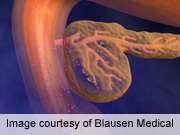(HealthDay)—For women with type 1 diabetes, intensive versus conventional treatment is not associated with menopause risk, although greater insulin dose is associated with lower natural menopause risk, according to research published in Diabetes Care.
Catherine Kim, M.D., M.P.H., from the University of Michigan in Ann Arbor, and colleagues conducted a secondary analysis of 657 women with type 1 diabetes in the randomized Diabetes Control and Complications Trial (DCCT) and its observational follow-up, the Epidemiology of Diabetes Interventions and Complications (EDIC) study. The impact of intensive versus conventional diabetes treatment on menopause was assessed.
After an average follow-up of 28 years, by EDIC year 18, the researchers found that 38 percent of women had experienced natural menopause and 18 percent had experienced surgical menopause. In intensive versus control groups, the ages at natural menopause (49.9 versus 49.0 years; P = 0.28) and surgical menopause (40.8 versus 42.0 years; P = 0.31) were similar. Treatment group, hemoglobin A1c (HbA1c), and microvascular complications were not linked to the risk of natural or surgical menopause in multivariate models. The risk of natural menopause was decreased with each 10 unit/day increase in insulin dosage (hazard ratio, 0.91), while each kg/m² increase in body mass index correlated with an elevated risk of surgical menopause (hazard ratio, 1.08).
"In the DCCT/EDIC, intensive versus conventional treatment group and HbA1c level were not associated with menopause risk," the authors write. "Greater insulin dose was associated with lower menopause risk."
Several pharmaceutical companies provided free or discounted supplies or equipment to support participants' adherence to the study.
More information:
Abstract
Full Text (subscription or payment may be required)
Journal information: Diabetes Care
Copyright © 2014 HealthDay. All rights reserved.




















